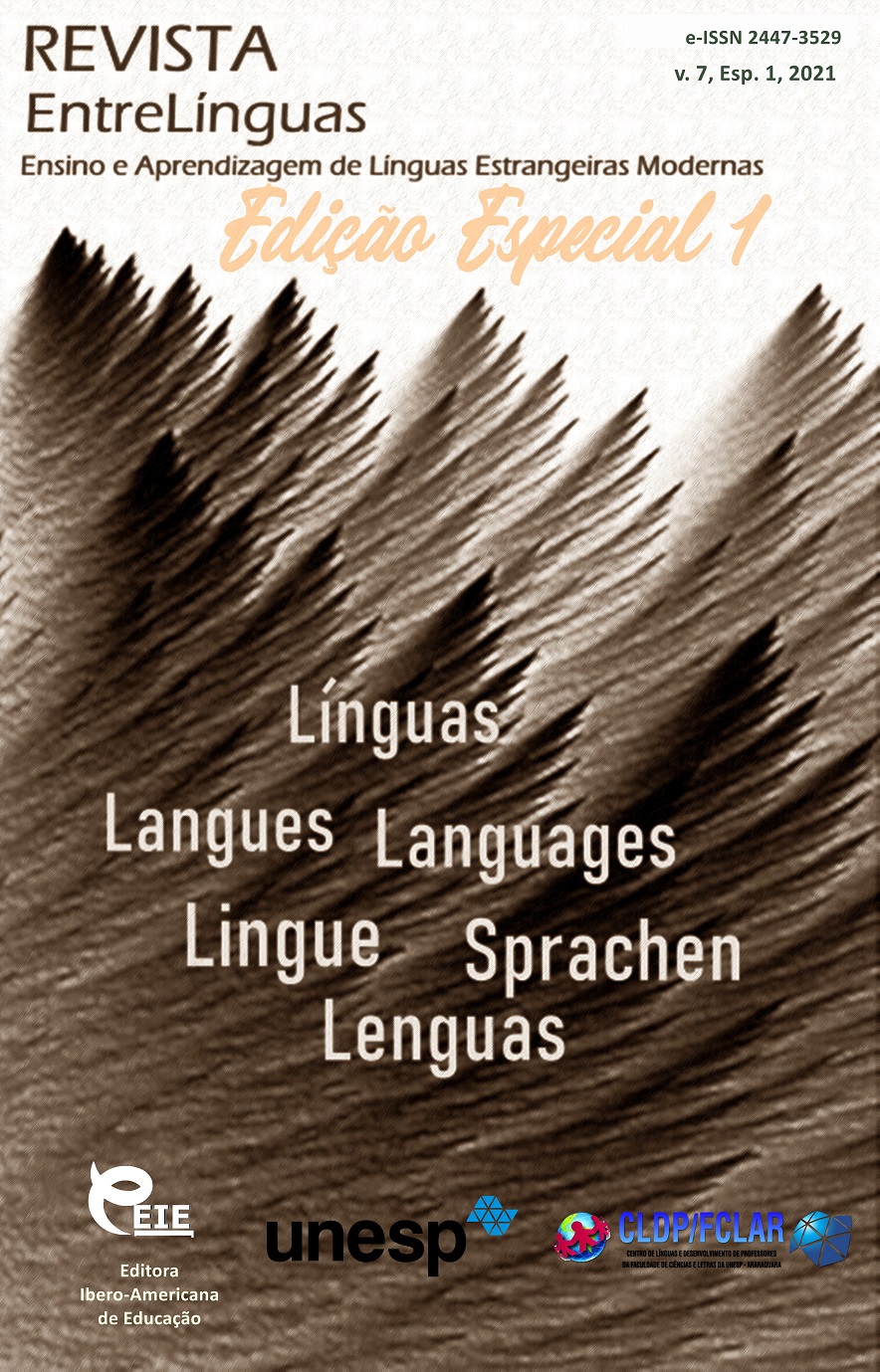Interactive teaching methods as means of foreign language communicative competence formation of university students
DOI:
https://doi.org/10.29051/el.v7iEsp1.14874Keywords:
Communicative ability, Interactive technology, Online platforms, Teaching techniques, Educational means, Educational process, TeamworkAbstract
The article depicts highlights in creating unknown dialect open ability by utilizing the intuitive instructing strategies. The bearings of building up the understudies' unknown dialect informative skill are resolved. Experimentation on abilities in the improvement of this fitness was done based on association between members. A similar examination of the outcomes in test and control bunches is proposed. The logical oddity of the article is that it portrays the adequacy of the experience of utilizing participation innovation and the online stage Technology Entertainment Design in the creating of unknown dialect informative fitness of understudies.
Downloads
References
BALL, D. L.; THAMES, M. H.; PHELPS, G. Content knowledge for teaching what makes it special? Journal of teacher education, v. 59, n. 5, p. 389-407, 2008.
BARAHOVICH, I. I. Формирование коммуникативной компетентности студентов педагогического колледжа [The formation of communicative competence of students at pedagogical College]. PhD Candidate Thesis. Krasnojarsk, 2000.
BARTH, M. et al. Developing key competencies for higher education. International Journal of Sustainability in Higher Education, v. 8, n. 4, p. 416-430, 2007. DOI: https://doi.org/10.1108/14676370710823582
BLACK, P.; WILIAM, D. Assessment and classroom learning. Assessment in Education, v. 5, n. 1, p. 1-74, 1998. DOI: https://doi.org/10.1080/0969595980050102
BROADFOOT, P. Empowerment or performativity? English assessment policy in the late twentieth century. In: British Educational Research Association Conference University of Sussex at Brighton. Brighton: University of Sussex, 1999.
DOLZHIKOVA, A.; KURILENKO, V.; BIRYUKOVA, Y.; GLAZOVA, O.; ARZUMANOVA R. Translation-oriented reading of scientific-technical texts vs ordinary reading: psychological and psycholinguistic aspects. XLinguae, v. 11, n. 2, p. 24-33, 2018. DOI: https://doi.org/10.18355/xl.2018.11.02.03
GUZHELYA, D.; BIRYUKOVA, Y.; SHCHERBAKOVA, O; AKHNINA, K.; MASLOVA, I. Linguodidactic modelling in teaching foreign languages to bilingual children. Revista Espacios, v. 40, n. 8, p. 1-17. 2018.
HALL, K.; HARDING, A. Level descriptions and teacher assessment in England: towards a community of assessment practice. Educational research, v. 44, n. 1, p. 1-16. 2002. DOI: https://doi.org/10.1080/00131880110081071
JOHNSON, D. H.; JOHNSON, F. P. Joining together: Group theory and group skills. 12. ed. New Jersey: Prentice-Hall, 2017.
KAJUMOV, D. F. et al. The imagery of spiritual concepts in teaching process expressed by Phraseological units of the English, Tatar and Turkish languages. Man In India, v. 97, n. 3, p. 597-609, 2017.
KHAYRUTDINOV, R. R.; NIKOLAEVA, O. A.; KOZLOVA, J. A.; SOKOLOVA, I. I. Bilingual modality translation of American literature. European Research Studies Journal, v. 20 (Special Issue), p. 458-468, 2017.
LEE, S. J.; LIU, Y. E.; POPOVIC, Z. Learning individual behavior in an educational game: A data-driven approach. In: INTERNATIONAL CONFERENCE ON EDUCATIONAL DATA MINING, 7., 2014, Indianapolis. Proceedings […]. Indianapolis, Indiana: EDM, 2014. p. 114-121.
LESTER, S. Professional standards, competence and capability. Higher Education, Skills and Work-based Learning, v. 27, n. 7, p. 31-43, 2014. DOI:10.1108/HESWBL0420130005
MACSUGA GAGE, A. S. et al. Effective teaching practices for a positive classroom environment. Beyond Behavior, v. 22, n. 1, p. 14-22, 2012. DOI: https://doi.org/10.1177/107429561202200104
NARAG, R. M. Sojourning of foreign students at cagayan state university: a case of intercultural communicative competence 2016. (Unpublished Dissertation) – Cagayan State University, Tuguegarao City, 2016.
PODESTA, J.; PRITZKER, P.; MONIZ, E.; HOLDER, J.; ZENTS, J. Big data: seizing opportunities, preserving values. Washington, DC: Executive Office of the President, 2014. Available in: https://obamawhitehouse.archives.gov/sites/default/files/docs/20150204_Big_Data_Seizing_Opportunities_Preserving_Values_Memo.pdf. Access: 11 sep. 2019.
SALEH, S. E. Understanding Communicative Competence. University Bulletin, v. 3, n. 5, p. 101-110, 2013.
SPENCER-OATEY, H.; FRANKLIN, P. Intercultural interaction: A multidisciplinary approach to intercultural communication (research and practice in applied linguistics). Basingstoke: Palgrave Macmillan, 2009. DOI: https://doi.org/10.1057/9780230244511
TELEZHKO, I.; BIRYUKOVA, Y.; KURILENKO, V. A model for forming tolerance in profession-oriented text translators as part of the process of developing their socio-cultural competence. XLinguae, v. 12, n. 1, p. 116-124. 2019. DOI: https://doi.org/10.18355/XL.2019.12.01.09
TUGUSHEVA, E. Z. et al. Forming Anticorruption Competence Through Teaching a Professionally-oriented Language Course. Modern Journal of Language Teaching Methods, v. 8, n. 11, p. 429-436, 2018.
UKEssays. Communicative competence in language teaching. 2018. Available in: https://www.ukessays.com/essays/englishlanguage/communicativecompetenceinthelanguageclassroomenglishlanguageessay.php?vref=1. Access: 11 sep. 2019.
WINTHER, E.; KLOTZ, V. K. Spezifika der beruflichen Kompetenzdiagnostik — Inhalte und Methodologie. Zeitschrift für Erziehungswissenschaft, v. 7, n. 1, p. 9-32, 2014. DOI: 10.1007/s1161801304554
ZEER, E. F.; SYMANYUK, E. E. Реализация компетентностного подхода в системе инновационного образования [Realization of the competencebased approach in the system of innovative education]. Innovacionnye proekty i programmy v obrazovanii, v. 4, p. 15-20, 2014.
Downloads
Published
How to Cite
Issue
Section
License

This work is licensed under a Creative Commons Attribution-NonCommercial-ShareAlike 4.0 International License.
Os manuscritos aceitos e publicados são de propriedade da Revista EntreLínguas. Os artigos publicados e as referências citadas na Revista EntreLínguas são de inteira responsabilidade de seus autores.
Transferência de direitos autorais – autorização para publicação
Caso o artigo submetido seja aprovado para publicação, já fica acordado que o(s) autor(es) autoriza(m) a UNESP a reproduzi-lo e publicá-lo na EntreLínguas, entendendo-se os termos “reprodução” e “publicação” conforme definição respectivamente dos incisos VI e I do artigo 5° da Lei 9610/98. O artigo poderá ser acessado pela rede mundial de computadores (Internet), sendo permitidas, a título gratuito, a consulta e a reprodução de exemplar do artigo para uso próprio de quem a consulta, desde que haja a citação ao texto consultado. Essa autorização de publicação 328 EntreLínguas, Araraquara, v. 1, n .2, p. 323-328, jul./dez. 2015 não tem limitação de tempo, ficando a UNESP responsável pela manutenção da identificação do(s) autor(es) do artigo. Os artigos publicados e as referências citadas na Revista EntreLínguas são de inteira responsabilidade de seus autores.











